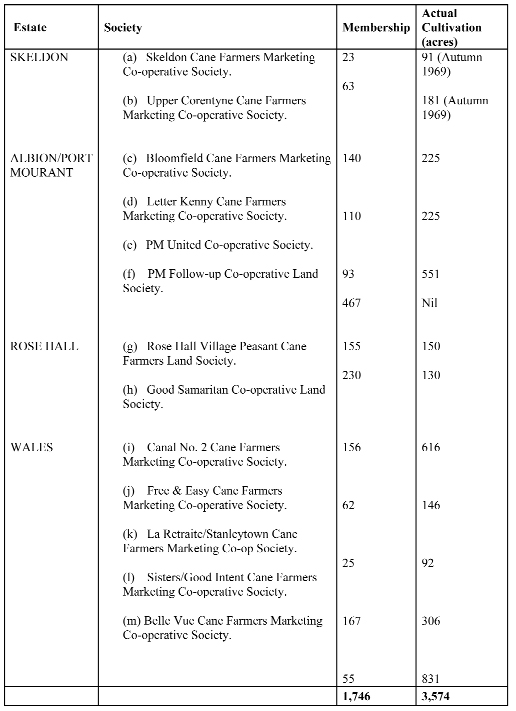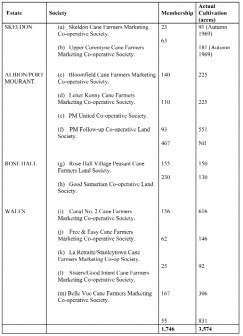Very briefly the sugar industry’s current governance structure constitutes of a board, with chairman; a chief executive officer; an executive management team, of which general managers of estates should be members.
Normal organisational arrangements anywhere would expect that the chairman and board are individually and jointly responsible for formulating policy, monitoring implementation, evaluating performance, and eventually accounting for final production and productivity of every operational component of that organisation.
For decades now organisations have also embraced the acknowledged approach of participative or collaborative decision-making, as it has proven to be most beneficial in that the policy implementers are fully involved in the process, and therefore can take ownership of delivery of the intended outputs.
GuySuCo, and its predecessor organisation, has been well known to adopt this management philosophy, recognising how effective ‘collegial’ decision-making energises the management team as a whole. Its acceptability was founded on the explicit fact of compliance with relevant laws, regulations, agreements (including those with unions), established systems, and set procedures – even for the necessary review process, which must take into account the attendant financial, industrial relations, and social implications, amongst others.
In this connection a landmark agreement between the two major players in the sugar industry at the time – Jock Campbell and Cheddi Jagan – resulted in the formal institution of a cane-farming component of the sugar industry. It was developed through the establishment of a number of Cane Farmers cooperatives, well before that of the Cooperative Republic of Guyana. The largest number of cooperative societies was formed around Wales Estate, in West Demerara, whose production is still substantially bolstered by farmers’ canes. Albion/Port Mourant Estate also saw large cane-farming societies being formed. Then there was Rose Hall Estate; while new farmers in the Skeldon Estate area consistently led the way with the highest cane yields.
There were of course good individual cane farmers in the Canje area of Berbice, as of course Diamond and Leonora in Demerara. All of these developments were funded through a special finance window called the Cane Farming Development Corporation – subscribed jointly by Demerara Co (Leonora/Diamond), Bookers Sugar Estates, Barclays Bank DCO and Royal Bank of Canada. The parties agreed with the government that cooperative societies had the appropriate legal status to negotiate the financing available.
By the end of 1969 cooperative cane farmers supplying Bookers Sugar Estates alone totalled 1,746, with 3,574 acres under cultivation. The following particulars may be of interest:
The financing structure was complemented by the passing of the National Cane Farming Committee Act, a particular feature of which were the Regulations to the Act which constituted the actual contract to be executed between the cane farmer and manufacturer, in order to ensure that both parties executed their respective undertakings, basically: a) the farmer to supply canes; b) the manufacturer (the estate) to provide (technical) support services, materials, plant, transport (punt), etc. The following quote refers:
“SECOND SCHEDULE
APPENDIX A
Rules of the Contract
Cost to be taken into Account and Method of Computing Charges for Drainage and Irrigation Facilities. r. 4(7)
“APPENDIX B
Rules of Contract
Cost to be taken into Account and Method of Computing Charges to Farmers for Cane Transport by Water. r. 8(2)
“8. (2) Except as hereinafter provided, all cane shall be transported through the navigation canals, and the cost of the transport shall be charged to the Farmer and paid for by him at the relevant rates calculated in accordance with the provisions set out in Appendix B to the Second Schedule.”
In Demerara a significant proportion of transport was by road and farmers increasingly acquired their own vehicles. Generally, however, the estates’ services and materials were supplied at agreed costs entrenched in the respective contracts, along with the critical formula for pricing the sugar produced from farmers’ canes.
All of these elements were part of a regular agenda for meetings of the National Cane Farming Committee established by National Cane Farming Committee Act, Cap. 69:04. The committee was to be composed, as provided by Section 3 of the Act, members appointed by the minister, including its chairman and vice chairman, as follows:
“a) “a) eight persons chosen by the Minister from among farmers who have been recommended for appointment by District Associations:
Provided that until such time as District Associations have been established under section 8, the Minister may appoint any farmer for any district;
b) three persons chosen by the Minister from a panel of seven nominated by the Association;
c) five official members; and
d) one person nominated by the Development Corporation.”
Section 6 of the Act deals with meetings of the committee, its membership and proceedings. Examination of this and other sections shows no reference to the minister’s involvement other than the power to appoint the National Cane Farming Committee and the creation of district associations.
It would be interesting therefore to learn from the relevant authorities to what extent the NCFC Act and related Regulations are currently being observed, not only in respect of district representation, but also in relation to the following matters listed in Section 11 of the Act:
“a) the general conditions which shall be deemed to be incorporated in every contract;
b) the registration of farmers;
c) the registration of contracts;
d) the records to be kept by farmers and the furnishing of reports and returns by them to the Committee; and
e) exemption, in special circumstances, of contracts from the application of the general conditions provided for under paragraph (a) of this subsection.”
It is a fair conclusion that not only has any of the parties read the Act and its Regulations, but more importantly no one seems to care. Were the relevant provisions being observed it would have long been patently obvious that there is need for amendments thereto, appropriate to existing conditions in the sugar industry.
So that it is hardly mind-boggling to learn of decisions being made between the non-statutory chairman (the subject Minister) and selected farmers as members of a ‘virtual’ NCFC; and then of directives being sent to the Chief Executive Officer, critically bypassing the Chairman and Board of GuySuCo in the process. In the clear absence of any consultation, particularly with regard to the final implications, the decision has provided substantive discomfort for GuySuCo’s executive team. However subject these managers are to the inanities of political wisdom, they must suffer the continued emasculation of what professionalism remains, without leave for effective response. They must abide one more display of mistaken governance, and muddle through the mire of non-principled organisational practices and behaviours.
Yours faithfully,
E B John







